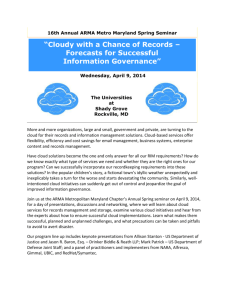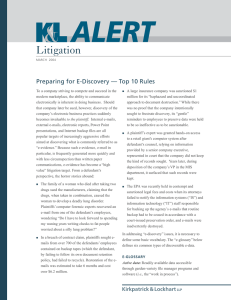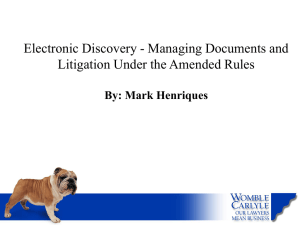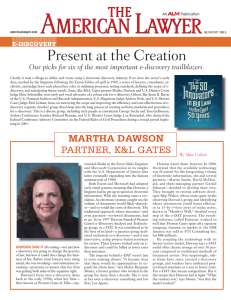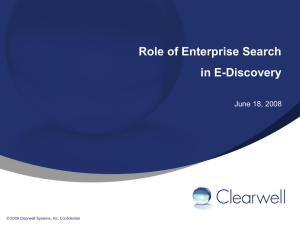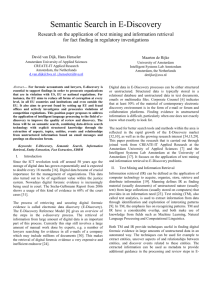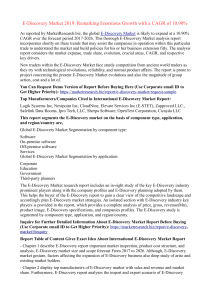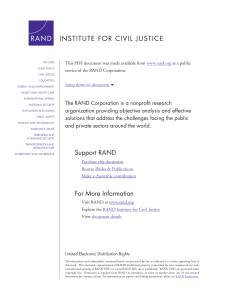Data Complexity: Expanding the Scope of Probabilistic Learning
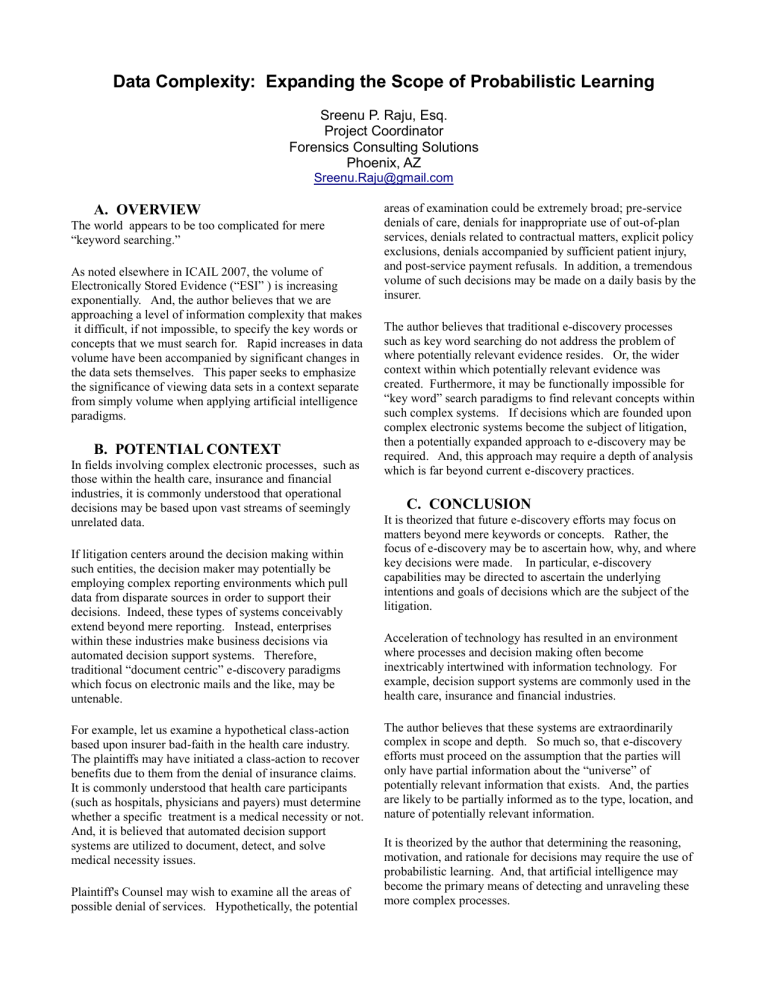
Data Complexity: Expanding the Scope of Probabilistic Learning
Sreenu P. Raju, Esq.
Project Coordinator
A.
OVERVIEW
Forensics Consulting Solutions
Phoenix, AZ
Sreenu.Raju@gmail.com
The world appears to be too complicated for mere
“keyword searching.” areas of examination could be extremely broad; pre-service denials of care, denials for inappropriate use of out-of-plan services, denials related to contractual matters, explicit policy exclusions, denials accompanied by sufficient patient injury,
As noted elsewhere in ICAIL 2007, the volume of
Electronically Stored Evidence (“ESI” ) is increasing exponentially. And, the author believes that we are approaching a level of information complexity that makes and post-service payment refusals. In addition, a tremendous volume of such decisions may be made on a daily basis by the insurer.
it difficult, if not impossible, to specify the key words or concepts that we must search for. Rapid increases in data volume have been accompanied by significant changes in the data sets themselves. This paper seeks to emphasize
The author believes that traditional e-discovery processes such as key word searching do not address the problem of the significance of viewing data sets in a context separate from simply volume when applying artificial intelligence paradigms.
B. POTENTIAL CONTEXT
where potentially relevant evidence resides. Or, the wider context within which potentially relevant evidence was created. Furthermore, it may be functionally impossible for
“key word” search paradigms to find relevant concepts within such complex systems. If decisions which are founded upon complex electronic systems become the subject of litigation, then a potentially expanded approach to e-discovery may be required. And, this approach may require a depth of analysis
In fields involving complex electronic processes, such as those within the health care, insurance and financial industries, it is commonly understood that operational decisions may be based upon vast streams of seemingly unrelated data. which is far beyond current e-discovery practices.
C.
CONCLUSION
It is theorized that future e-discovery efforts may focus on
If litigation centers around the decision making within such entities, the decision maker may potentially be employing complex reporting environments which pull data from disparate sources in order to support their matters beyond mere keywords or concepts. Rather, the focus of e-discovery may be to ascertain how, why, and where key decisions were made. In particular, e-discovery capabilities may be directed to ascertain the underlying intentions and goals of decisions which are the subject of the litigation. decisions. Indeed, these types of systems conceivably extend beyond mere reporting. Instead, enterprises within these industries make business decisions via automated decision support systems. Therefore, traditional “document centric” e-discovery paradigms which focus on electronic mails and the like, may be untenable.
Acceleration of technology has resulted in an environment where processes and decision making often become inextricably intertwined with information technology. For example, decision support systems are commonly used in the health care, insurance and financial industries.
For example, let us examine a hypothetical class-action based upon insurer bad-faith in the health care industry.
The plaintiffs may have initiated a class-action to recover benefits due to them from the denial of insurance claims.
It is commonly understood that health care participants
(such as hospitals, physicians and payers) must determine whether a specific treatment is a medical necessity or not.
And, it is believed that automated decision support systems are utilized to document, detect, and solve medical necessity issues.
The author believes that these systems are extraordinarily complex in scope and depth. So much so, that e-discovery efforts must proceed on the assumption that the parties will only have partial information about the “universe” of potentially relevant information that exists. And, the parties are likely to be partially informed as to the type, location, and nature of potentially relevant information.
It is theorized by the author that determining the reasoning, motivation, and rationale for decisions may require the use of probabilistic learning. And, that artificial intelligence may become the primary means of detecting and unraveling these
Plaintiff's Counsel may wish to examine all the areas of more complex processes. possible denial of services. Hypothetically, the potential

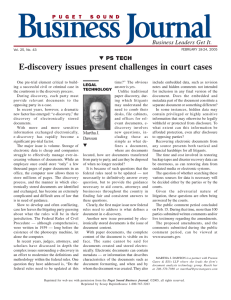
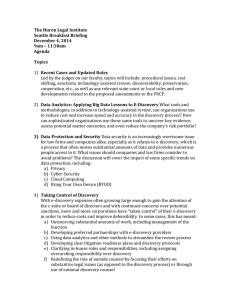
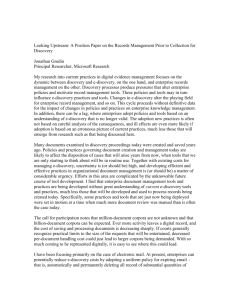
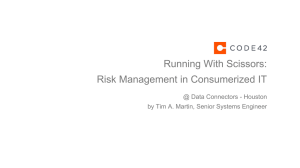
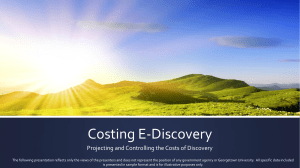

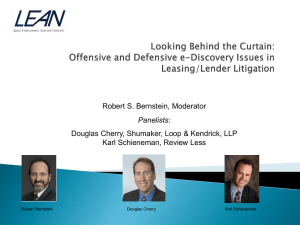
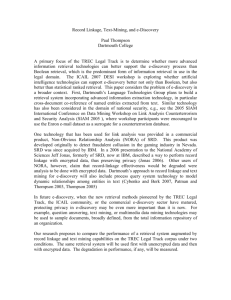
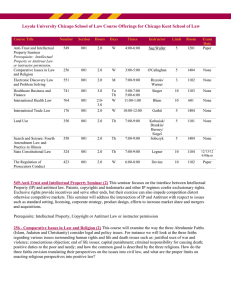
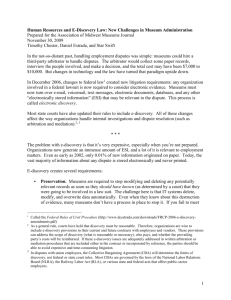
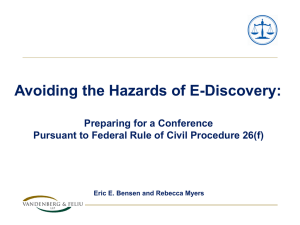
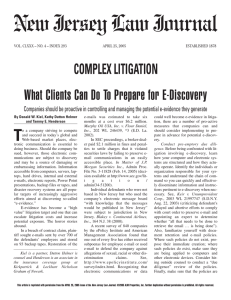
![Job Title [Position]: E-Discovery Technology Analyst Job Category](http://s3.studylib.net/store/data/006902182_1-1691051d5b109ca41d9e22efa1a51300-300x300.png)
